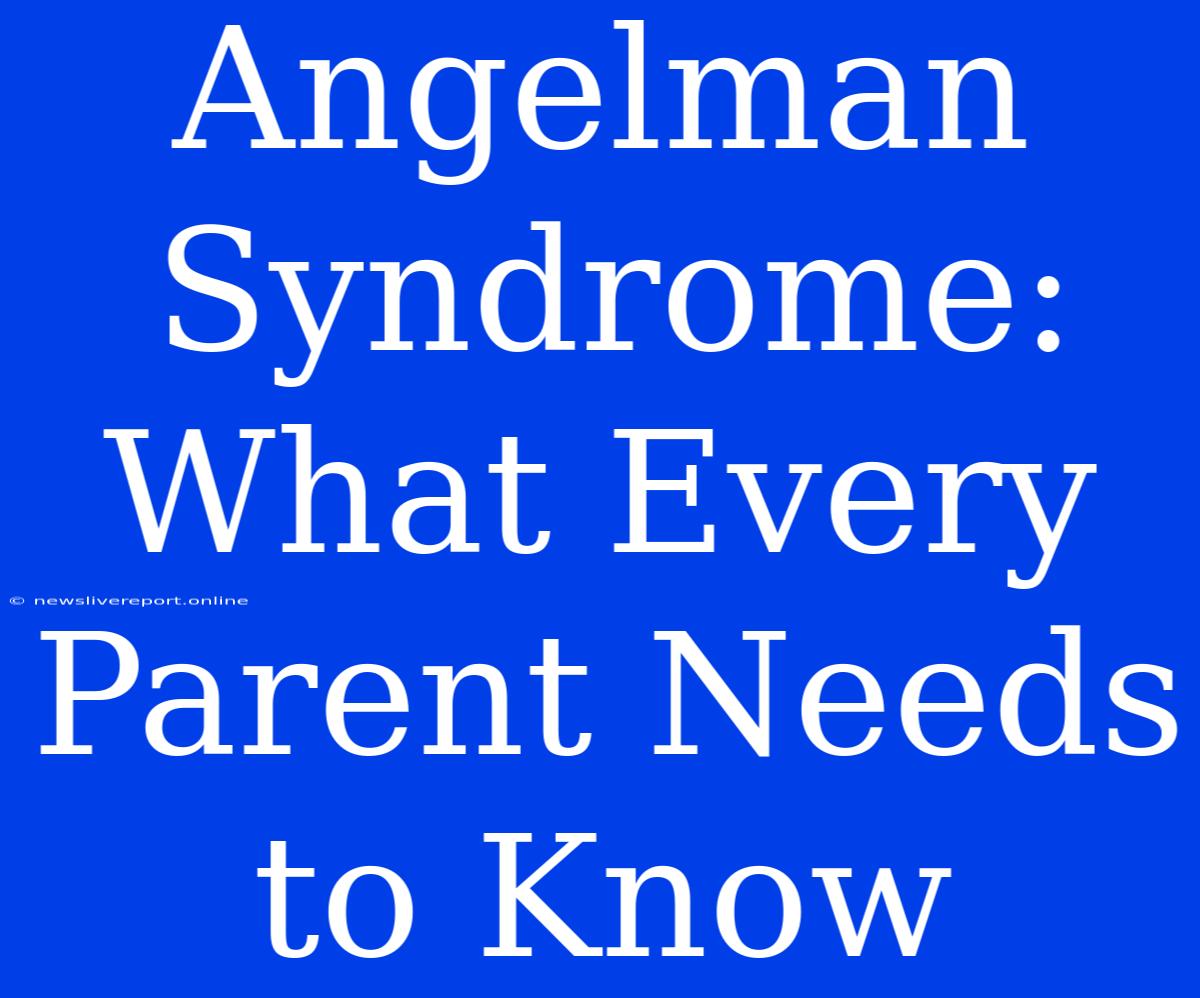Angelman Syndrome: What Every Parent Needs To Know
Angelman syndrome (AS) is a rare neuro-genetic disorder that affects the nervous system, causing developmental delays, intellectual disability, and behavioral challenges. While it may be unfamiliar to many, understanding AS is crucial for families who might be navigating the challenges of this condition. This article provides a comprehensive guide to Angelman syndrome, focusing on what parents need to know to provide the best care for their children.
What is Angelman Syndrome?
Angelman syndrome is a complex genetic disorder caused by a missing or inactive gene on chromosome 15. This gene, known as UBE3A, is responsible for producing a protein essential for proper brain development and function. When this gene is missing or not working correctly, it disrupts normal brain activity, leading to the characteristic features of AS.
Common Symptoms and Characteristics of Angelman Syndrome:
Children with Angelman syndrome often present with a unique combination of symptoms, including:
- Developmental Delays: Significant delays in reaching developmental milestones, including speech and language development, motor skills, and cognitive abilities.
- Intellectual Disability: Individuals with AS often have varying degrees of intellectual disability, making it challenging for them to learn and understand information at the same rate as their peers.
- Behavioral Challenges: Children with AS may exhibit behavioral challenges such as:
- Happy Disposition: Often referred to as "happy puppets," they frequently exhibit a cheerful and excitable personality.
- Frequent Laughter and Smiling: Even in unexpected situations, they often laugh and smile.
- Hyperactivity: Increased energy levels and difficulty concentrating are common.
- Sleep Disturbances: Difficulty falling asleep and frequent night awakenings are often experienced.
- Physical Characteristics: These may include:
- Seizures: Approximately 80% of individuals with AS experience seizures.
- Ataxia: A lack of muscle coordination and balance.
- Jerky Movements: Unusual movements that appear jerky and uncontrolled.
- Protruding Tongue: The tongue may stick out of the mouth frequently.
- Wide Mouth with a Gap Between the Teeth: A wide mouth with a small jaw is common.
- Light Hair and Skin: Fair skin and light hair are often observed.
Diagnosis of Angelman Syndrome:
Diagnosing AS is a multi-step process involving a thorough assessment by a healthcare professional, including:
- Physical Exam: A doctor will examine the child for physical characteristics associated with AS.
- Genetic Testing: This is the most definitive way to diagnose AS. It involves analyzing a blood sample to check for the missing or inactive UBE3A gene.
- Electroencephalogram (EEG): An EEG measures electrical activity in the brain and helps identify abnormal brain patterns associated with seizures.
- Developmental Assessment: An assessment of the child's developmental milestones and cognitive abilities.
- Behavioral Evaluation: Observing the child's behavior and assessing their interactions with their environment.
Treatment and Management of Angelman Syndrome:
There is currently no cure for Angelman syndrome, but various treatments and management strategies can help individuals with AS thrive and reach their full potential:
- Early Intervention: Early intervention programs, such as speech therapy, occupational therapy, physical therapy, and behavioral therapy, are crucial for maximizing a child's development and addressing specific challenges.
- Medication: Medications are often prescribed to manage seizures and behavioral challenges.
- Supportive Therapies: Therapies like speech therapy, occupational therapy, and physical therapy help individuals with AS develop their skills and improve their independence.
- Educational Support: Specialized educational programs and individualized learning plans can cater to the specific needs of children with AS.
- Family Support: Support groups and online communities provide a platform for families to share experiences, connect with others facing similar challenges, and find resources.
Living with Angelman Syndrome:
Raising a child with Angelman syndrome presents unique challenges, but it's important to remember that every child is unique, and their journey will be different. By understanding the condition, seeking the right support, and celebrating their strengths and abilities, families can create a fulfilling and supportive environment for their child to thrive.
Tips for Parents:
- Learn About Angelman Syndrome: Educate yourself about the condition to understand its complexities and available resources.
- Connect with Other Families: Join support groups or online communities to connect with families going through similar experiences and share information.
- Advocate for Your Child's Needs: Speak up for your child's rights and access to appropriate services and therapies.
- Celebrate Your Child's Uniqueness: Focus on their strengths and celebrate their unique personality and talents.
- Seek Professional Help: Don't hesitate to seek guidance from healthcare professionals, therapists, and educators specialized in Angelman syndrome.
Conclusion:
Angelman syndrome is a complex and challenging condition, but with the right knowledge, support, and intervention, individuals with AS can live fulfilling and meaningful lives. By understanding the condition, seeking professional guidance, and embracing a positive outlook, families can provide the best possible care for their children with Angelman syndrome.

